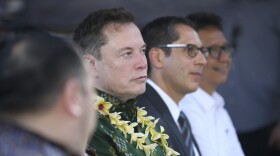One of the world’s biggest carmakers is staking out new territory in Southeast Asia. Toyota is stepping up its plans to produce electric vehicles in Indonesia.
Just a few months ago, Toyota’s president said the company will be spending some two billion U.S. dollars over the next four years to develop electric vehicles in Indonesia. Hybrids were the initial focus, but next up are cars powered entirely by electric batteries.
The president of Toyota’s Indonesian unit told reporters at the Tokyo Motor Show this week that his company is ready to start production of EV’s.
Toyota has been a joint venture partner for auto production in Indonesia for nearly fifty years — but the shift to electric vehicles is a major development for both the company and the country.
Indonesia’s government has a goal of turning 20% of Indonesia’s total car production to electric vehicles by the year 2025.
Toyota’s goal is even more ambitious: transforming half of its overall global sales into electric vehicles by that same year – 2025.
For Indonesia, there’s another national economic interest at play: nickel. Nickel plays a key role in the production of electric vehicle batteries. Indonesia has a lot of it in the ground, and has announced it is banning the export of the commodity.
While that move will cut trade revenue in the short term, the government’s bet is that the restriction will attract foreign makers of vehicles and batteries to invest and build their manufacturing facilities in Indonesia.




